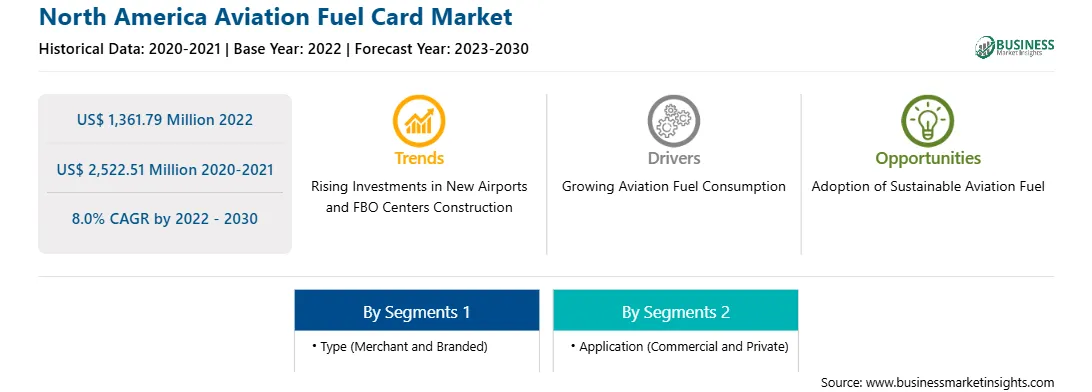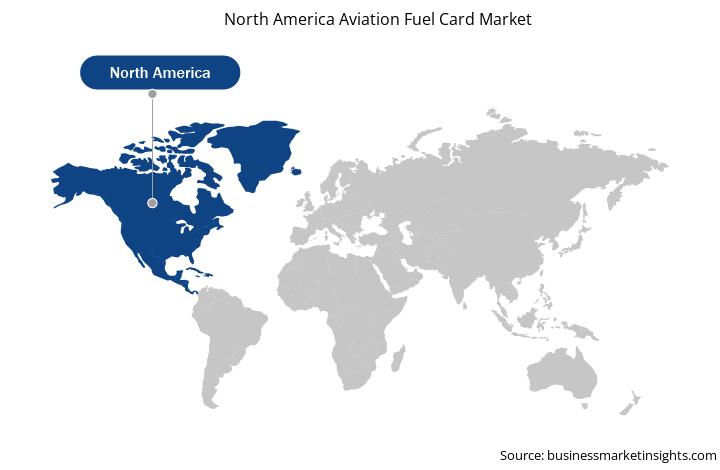Marktprognose für Flugtankkarten in Nordamerika bis 2030 – Regionale Analyse – nach Typ (Handels- und Markenprodukte) und Anwendung (kommerziell und privat)
No. of Pages: 72 | Report Code: BMIRE00030053 | Category: Aerospace and Defense
No. of Pages: 72 | Report Code: BMIRE00030053 | Category: Aerospace and Defense
Strategic insights for North America Aviation Fuel Card involve closely monitoring industry trends, consumer behaviours, and competitor actions to identify opportunities for growth. By leveraging data analytics, businesses can anticipate market shifts and make informed decisions that align with evolving customer needs. Understanding these dynamics helps companies adjust their strategies proactively, enhance customer engagement, and strengthen their competitive edge. Building strong relationships with stakeholders and staying agile in response to changes ensures long-term success in any market.

| Report Attribute | Details |
|---|---|
| Market size in 2022 | US$ 1,361.79 Million |
| Market Size by 2030 | US$ 2,522.51 Million |
| Global CAGR (2022 - 2030) | 8.0% |
| Historical Data | 2020-2021 |
| Forecast period | 2023-2030 |
| Segments Covered |
By Typ
|
| Regions and Countries Covered | Nordamerika
|
| Market leaders and key company profiles |
The regional scope of North America Aviation Fuel Card refers to the geographical area in which a business operates and competes. Understanding regional nuances, such as local consumer preferences, economic conditions, and regulatory environments, is crucial for tailoring strategies to specific markets. Businesses can expand their reach by identifying underserved regions or adapting their offerings to meet regional demands. A clear regional focus allows for more effective resource allocation, targeted marketing, and better positioning against local competitors, ultimately driving growth in those specific areas.

1. Shell Plc
2. BP Plc
3. Associated Energy Group LLC
4. TITAN Aviation Fuels Inc
5. CSI Enterprises Inc
6. TotalEnergies SE
7. EPIC Aviation LLC
8. Kropp Holdings Inc
9. Avfuel Corp
10. Multi Service Corp
The North America Aviation Fuel Card Market is valued at US$ 1,361.79 Million in 2022, it is projected to reach US$ 2,522.51 Million by 2030.
As per our report North America Aviation Fuel Card Market, the market size is valued at US$ 1,361.79 Million in 2022, projecting it to reach US$ 2,522.51 Million by 2030. This translates to a CAGR of approximately 8.0% during the forecast period.
The North America Aviation Fuel Card Market report typically cover these key segments-
The historic period, base year, and forecast period can vary slightly depending on the specific market research report. However, for the North America Aviation Fuel Card Market report:
The North America Aviation Fuel Card Market is populated by several key players, each contributing to its growth and innovation. Some of the major players include:
The North America Aviation Fuel Card Market report is valuable for diverse stakeholders, including:
Essentially, anyone involved in or considering involvement in the North America Aviation Fuel Card Market value chain can benefit from the information contained in a comprehensive market report.